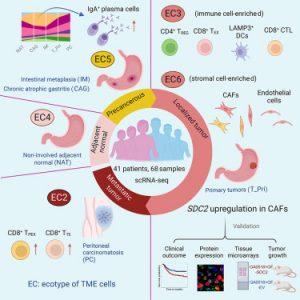Gastric adenocarcinoma, a highly lethal form of cancer, poses challenges due to inherent treatment resistance. However, the cellular and molecular mechanisms underlying the transition from early pre-cancerous stages to tumor formation and metastasis remain poorly understood.
In a recent study, researchers have described the evolution of the tumor microenvironment during the progression of gastric cancer. This study not only sheds light on the link between multicellular communities and clinical outcomes but also identifies a potential new therapeutic target (Figure 1).
By utilizing single-cell RNA sequencing (scRNA-seq) data, the research team characterized the diverse populations of immune and stromal cells within the tumor microenvironment. They identified exploitable targets that could potentially modulate the tumor microenvironment.
The team identified six unique “ecotypes”, each dominated by specific immune and stromal cell states, the two most important being, EC3 and EC6 were found to correlate with different histological, genomic, and clinical features of primary gastric adenocarcinomas.
The study also identified SDC2 as a potential therapeutic target worthy of further investigation. The researchers found that SDC2 was overexpressed in stromal cells, particularly in cancer-associated fibroblasts, and was correlated with aggressive disease, advanced stages, and unfavourable survival outcomes. SDC2 expression was consistently elevated in stromal cells across various other cancer types, such as pancreatic cancer and colorectal cancer for example. This study not only enhances our understanding of the complex tumour microenvironment dynamics in gastric cancer but also highlights the potential of SDC2 as a therapeutic target.
By deciphering the intricate interplay between different cell populations within the tumor microenvironment, we move closer to developing personalized therapies that can effectively combat gastric cancer and improve patient outcomes.
Journal article: Wang, R., et al. 2023. Evolution of immune and stromal cell states and ecotypes during gastric adenocarcinoma progression. Cancer Cell.
Summary by Stefan Botha











